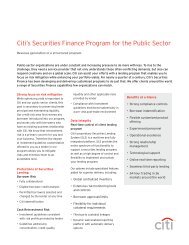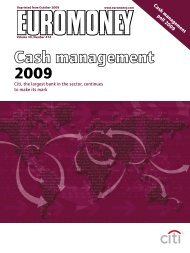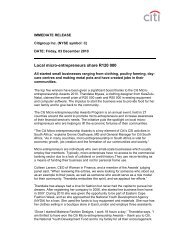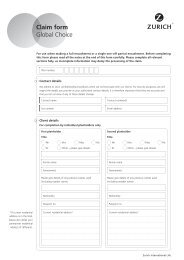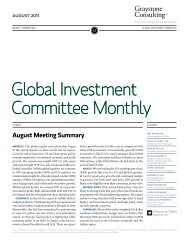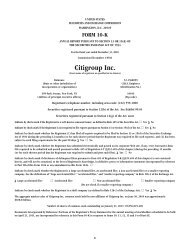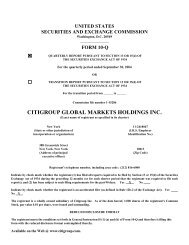7.3 billion - Citigroup
7.3 billion - Citigroup
7.3 billion - Citigroup
Create successful ePaper yourself
Turn your PDF publications into a flip-book with our unique Google optimized e-Paper software.
Citi will account for the refinancing concessions based onwhether each borrower is determined to be experiencingfinancial difficulty based on sufficient underwriting. When arefinancing concession is granted to a borrower that isexperiencing financial difficulty, the loan will be accountedfor as a TDR. Otherwise, the impact of the refinancingconcessions will be recognized over a period of years in theform of lower interest income. As of March 31, 2012, it is notpossible to estimate the number of refinance concessions thatwill be accounted for as TDRs. Citi does not currently expectthese refinancing concessions to have a material impact on thefair value of the modified mortgage loans.Consumer Mortgage FICO and LTVAs a consequence of the financial crisis, economicenvironment and the decrease in housing prices, LTV andFICO scores for Citi‘s residential first mortgage and homeequity loan portfolios have generally deteriorated sinceorigination, particularly in the case of originations between2006 and 2007, although, as set forth in the tables below, thenegative migration has generally stabilized. Generally, on arefreshed basis, approximately 31% of residential firstmortgages had a LTV ratio above 100%, compared toapproximately 0% at origination. Similarly, approximately35% of residential first mortgages had FICO scores less than660 on a refreshed basis, compared to 26% at origination.With respect to home equity loans, approximately46% of home equity loans had refreshed LTVs above 100%,compared to approximately 0% at origination. Approximately25% of home equity loans had FICO scores less than 660 on arefreshed basis, compared to 9% at origination.FICO and LTV Trend Information—North AmericaConsumer MortgagesResidential First MortgagesIn <strong>billion</strong>s of dollars100806040200Residential First Mortgages (in <strong>billion</strong>s of dollars)36.2 37.4 39.6 39.6 38.815.1 13.8 12.2 13.2 13.919.2 18.6 18.7 17.8 16.912.9 11.9 10.7 11.1 11.31Q11 2Q11 3Q11 4Q11 1Q12FICO < 660, LTV > 100% FICO < 660, LTV ≤ 100%FICO ≥ 660, LTV > 100% FICO ≥ 660, LTV ≤ 100%Res Mortgage - 90+ DPD % 1Q11 2Q11 3Q11 4Q11 1Q12FICO ≥ 660, LTV ≤ 100% 0.4% 0.3% 0.3% 0.4% 0.3%FICO ≥ 660, LTV > 100% 1.1% 1.1% 1.2% 1.2% 1.2%FICO < 660, LTV ≤ 100% 11.0% 9.8% 10.0% 10.7% 10.5%FICO < 660, LTV > 100% 16.6% 15.3% 14.9% 16.5% 17.2%Home Equity LoansIn <strong>billion</strong>s of dollars56CITIGROUP – 2012 FIRST QUARTER 10-Q6040200Home Equity Loans (in <strong>billion</strong>s of dollars)19.8 19.1 19.4 18.4 16.614.6 13.6 12.5 12.8 13.05.1 5.3 5.3 4.5 4.65.8 5.8 5.3 5.4 5.41Q11 2Q11 3Q11 4Q11 1Q12FICO < 660, LTV > 100% FICO < 660, LTV ≤ 100%FICO ≥ 660, LTV > 100% FICO ≥ 660, LTV ≤ 100%Home Equity - 90+ DPD % 1Q11 2Q11 3Q11 4Q11 1Q12FICO ≥ 660, LTV ≤ 100% 0.1% 0.1% 0.1% 0.3% 0.1%FICO ≥ 660, LTV > 100% 0.3% 0.1% 0.1% 0.2% 0.2%FICO < 660, LTV ≤ 100% 7.7% 7.0% 7.4% 7.6% 7.2%FICO < 660, LTV > 100% 11.7% 10.1% 10.3% 10.3% 9.4%Notes:– Data appearing in the tables above have been sourced from Citi‘s risksystems and, as such, may not reconcile with disclosures elsewheregenerally due to differences in methodology or variations in the manner inwhich information is captured. Citi has noted such variations in instanceswhere it believes they could be material to reconcile to the informationpresented elsewhere.– Tables exclude loans in Canada and Puerto Rico, loans guaranteed by U.S.government agencies (residential first mortgages table only), loans recordedat fair value (residential first mortgages table only) and loans subject toLTSCs.– Balances exclude deferred fees/costs.– Tables exclude balances for which FICO or LTV data is unavailable. Forresidential first mortgages, balances for which such data is unavailableincludes $0.6 <strong>billion</strong> for 1Q11, and $0.4 <strong>billion</strong> in each of 2Q11, 3Q11,4Q11, and 1Q12. For home equity loans, balances for which such data isunavailable includes $0.1 <strong>billion</strong> in 1Q11, $0.3 <strong>billion</strong> in 2Q11, $0.2 <strong>billion</strong>in each of 3Q11, 4Q11, and 1Q12.Citi‘s residential first mortgage delinquencies continue toshow the impact of re-defaults of previously modifiedmortgages. The level of 90+ days past due for residential firstmortgages with refreshed FICO scores of less than 660 can beattributed to the decline in Citi‘s asset sales of delinquent firstmortgages, the lengthening of the foreclosure process and thecontinued economic uncertainty, as discussed in the sectionsabove.Although home equity loans are typically in junior lienpositions and residential first mortgages are typically in a firstlien position, residential first mortgages historically haveexperienced higher delinquency rates as compared to homeequity loans. Citi believes this difference is primarily due tothe fact that residential first mortgages are written down tocollateral value less cost to sell at 180 days past due andremain in the delinquency population until full dispositionthrough sale, repayment or foreclosure, whereas home equityloans are generally fully charged off at 180 days past due andthus removed from the delinquency calculation. In addition,due to the longer timelines to foreclose on a residential firstmortgage (see ―Foreclosures‖ above), these loans tend toremain in the delinquency statistics for a longer period and,



